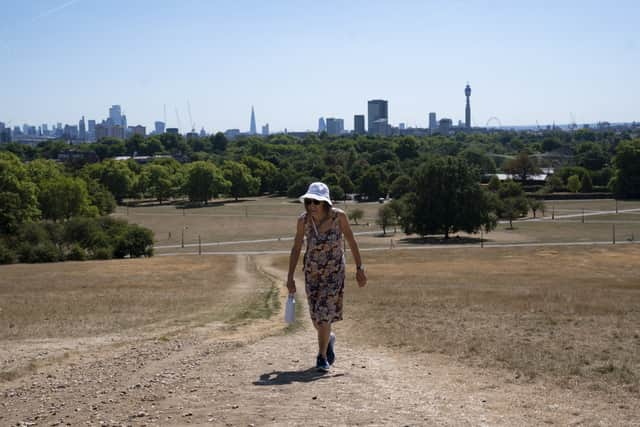Amber weather warning and heat health alert issued as UK braces for another heatwave
and live on Freeview channel 276
Most of England and parts of Wales will see temperatures above 30 degrees as the Met Office issues an amber warning for extreme heat.
The Met Office and the UK Health Security Agency (UKHSA) have issued health alerts and weather warnings amid soaring temperatures expected to hit most of England and Wales this week.
Advertisement
Hide AdAdvertisement
Hide AdThis comes just a few weeks after mid-Julys record breaking heat wave that had Heathrow Airport in London recording temperatures of 40.2 degrees celsius and with the driest July since 1935 also occurring the same month.
The warning will come into play at midnight on Thursday, and will last until 23:59 on Sunday.


The UK government has also warned of the risk of wildfires, saying: “High temperatures also present a risk of wildfires, especially after long dry periods.
“People with pre-existing heart and lung conditions such as asthma are most susceptible as breathing wildfire smoke may worsen their symptoms.
Advertisement
Hide AdAdvertisement
Hide Ad“Children and older people may also be susceptible to health impacts.”
What is an Amber weather warning and what has the Met Office said?
The Met Office defines an amber warning as an increased likelihood of impacts from severe weather, which could potentially disrupt plans.
This means there is the possibility of travel delays, road and rail closures, power cuts and the potential risk to life and property.
Tony Wardle, Met Office Deputy Chief Meteorologist, said: “Heatwave criteria look likely to be met for large areas of the UK later this week, with the hottest areas expected in central and southern England and Wales on Friday and Saturday.
Advertisement
Hide AdAdvertisement
Hide Ad“Temperatures could peak at 35⁰C, or even an isolated 36⁰C on Saturday.
“Elsewhere will see temperatures widely into the high 20s and low 30s Celsius later this week as temperatures build day-on-day through the week due to an area of high pressure extending over much of the UK.


“Coupled with the high daytime temperatures will be continued warm nights, with the mercury expected to drop to only around low 20s Celsius for some areas in the south.”
What is a Heat-Health alert and what has the UK Health Security Agency said?
A heat-health alert is issued by the UKHSA for health and social care professionals and emergency planners to prepare for added pressure due to heat related health issues.
Advertisement
Hide AdAdvertisement
Hide AdThe Heat-Health alert has five levels (0-4), and the one issued for Thursday 11 August to Sunday 14 August is a level 3. According to the UKHSA, this includes looking out for others, especially older people, young children and babies and those with underlying health conditions. The UKHSA advises people to close curtains on rooms that face the sun to keep indoor spaces cooler and to remember it may be cooler outdoors than indoors. People are also advised to drink plenty of fluids and avoid excess alcohol, dress appropriately for the weather and slow down when it is hot.
Head of Extreme Events and Health Protection at the UK Health Security Agency (UKHSA), Dr Agostinho Sousa, said: “Temperatures will feel very warm again this week, particularly in southern and central parts of the country.
“It’s important to ensure that people who are more vulnerable – elderly people who live alone and people with underlying health conditions – are prepared for coping during the hot weather.
“The most important advice is to ensure they stay hydrated, keep cool and take steps to prevent their homes from overheating.”
Comment Guidelines
National World encourages reader discussion on our stories. User feedback, insights and back-and-forth exchanges add a rich layer of context to reporting. Please review our Community Guidelines before commenting.
